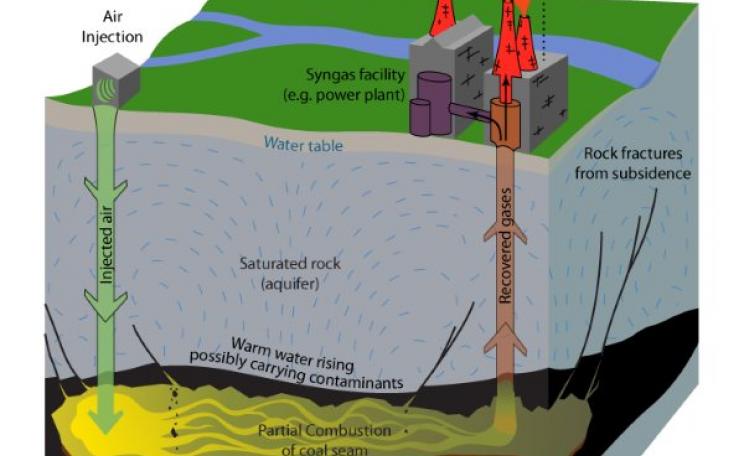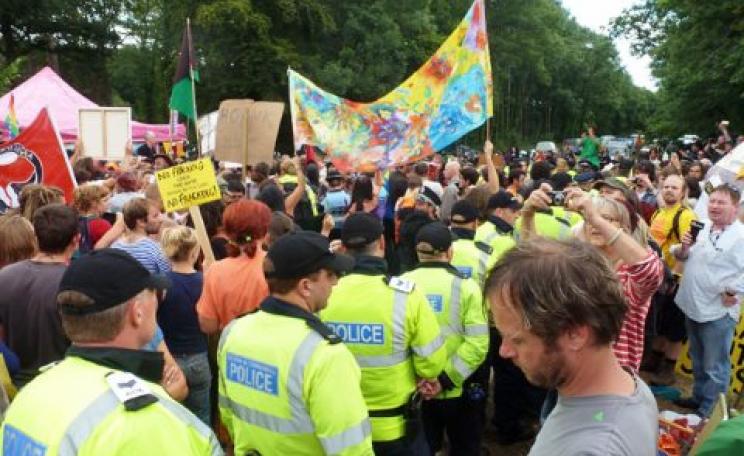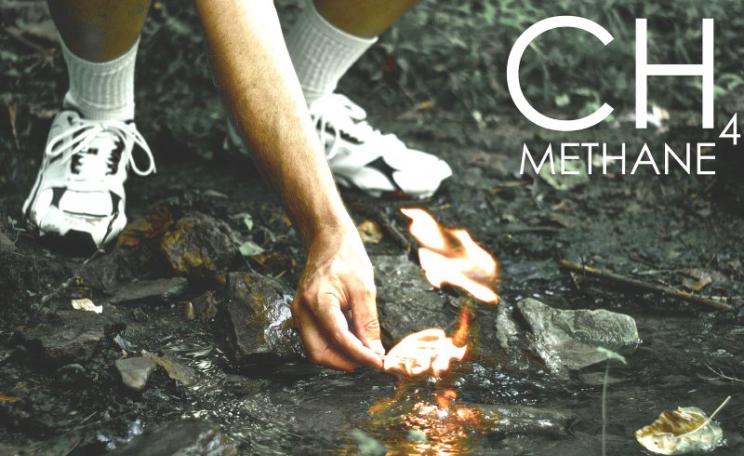In the place of public involvement, or evidence to back up Government claims, we get stooges - public relations representatives who say what the political consensus wants to hear.
During the 2000s the 'fracking boom' in the USA was fuelled by speculative Wall Street finance. When that bubble burst in 2008, the dodgy finance was cut off and the number of drilling rigs collapsed by over 50% within a few months.
Last December, I wrote in The Ecologist of how the 'funny money' from quantitative easing was once more fuelling the number of drilling rigs, supporting the Ponzi-style 'shale bubble'.
Just over a week ago I wrote of how that junk-debt-fuelled house of cards was being shaken by the fall in oil prices.
Now Baker-Hughes, the US drilling services company which monitors industry trends, has announced the biggest weekly decline in US drilling activity since 1991; and the decline over the last six weeks - the decommissioning of 209 rigs - is the largest since their records began in 1987.
An upcoming production downturn
That interruption in the 'shale drilling treadmill' means that the clock has started to tick. Within a year or so, due to the high decline rate of unconventional oil and gas wells, production will begin to tail-off once more.
The gas drilling stall in 2008 led to gas production levelling-off in 2011/12. When quantitative easing cash flooded in to turn the drills back on again, many rigs switched to drilling for shale oil instead. Today it's not clear whether the US government can or will prevent the 'shale bubble' imploding.
In addition to the finance issues, over the last few weeks we've also seen health and environmental agencies in New York State and Quebec recommend bans on future development of the industry there.
Whether or not these difficulties will bring an official realisation of the unsustainable nature of unconventional fossil fuels is not clear. That same finance treadmill ensures those involved in the industry make big bucks from this process.
As a result they have the ready cash to pay public relations agencies to obfuscate the debate on unconventional gas and oil.
In the place of public involvement, or evidence to back up Government claims, we get stooges - public relations representatives who say what the political consensus wants to hear.
Crisis? What crisis?
And here in Britain? In the corridors of power, the events of recent weeks appear to have had no recognition whatsoever. The problems of the global oil and gas industry - from the US to Britain, to Australia - has not diverted the political shale gas and oil bandwagon (at least in England and Wales).
Last week I attended the public hearings for the Environmental Audit Committee's (EAC) inquiry into the 'environmental impacts of fracking'. For me, those sessions typify the problems our national politics has in examining contentious public debates.
The Committee did not appear to want any specific detail of what the impacts of fracking would be in Britain - demonstrated by experience elsewhere, or through analysis of the proposals outlined by the Department for Energy and Climate Change.
And though the Committee were looking at the 'environmental impacts', much of the debate was centred around conventional economics and investment models - not the identification of ecological or health impacts.
At the same time, across Parliament Square, the Government were trying to steamroller through their shale project as part of the Infrastructure Bill - from tax breaks for drillers, to weakened regulation, all designed to facilitate the Government's unsubstantiated case for a UK 'shale revolution'.
The myth of a 'balanced debate'
Politicians might call for a 'balanced debate on shale', but arguably it is they who are peddling a manufactured rhetoric. This is because the political process has been hijacked by lobbyists paid by the industry, whose manipulative tendrils reach right inside the Government.
For me, the most eye-opening part of the EAC's evidence session was when Caroline Spelman asked, "What could be done to address public mistrust over fracking and who would be trusted to provide an objective assessment of the pros and cons?"
They very fact the question was posed shows how out of touch politicians are on this issue. For example, they could start by asking representatives of public to their inquiry, to ask them directly what their concerns are.
Instead what we often get in the place of public involvement, or the substantiation of the Government's claims using objective evidence, are stooges - public relations representatives who say what the political consensus wants to hear.
The witness at the EAC's inquiry I found the most troublesome was Chris Smith: formerly chair of the Environment Agency (who issued Cuadrilla's fracking permit last week); chair of the Advertising Standards Authority (who recently took umbrage at an anti-fracking leaflet); and chair of the new 'independent' Task Force on Shale Gas.
The problem for the Committee was that the Task Force on Shale Gas hasn't done any work yet! All Smith could do was apologetically state that they would produce statements on a range of issues at some future date.
Industry 'astroturf' has become the benchmark of impartiality
While the Task Force on Shale Gas might laud itself as being independent, and command Parliamentary time in the place of those who might have something substantive to say, the details surrounding the Task Force's organisation say something rather different.
There is another body called the All Party Parliamentary Group (APPG) on Unconventional Gas and Oil. Like a number of other APPGs in Parliament it's essentially an industry 'astroturf' group, set up as a lobbying vehicle to access decision-makers in government.
The secretariat for APPG on Unconventional Gas and Oil is provided by a political lobbying company, Edelman, using funding from companies with direct links to or investment in the shale gas industry - such as IGas, Cuadrilla, The Weir Group, Centrica, Total and GDF Suez.
And what has this to do with Chris Smith's 'independent' Task Force on Shale Gas?:
- Their secretariat is also provided by Edelman;
- Their communications are run by the 'strategy' company Hill and Knowlton - who have a track record of political astroturfing; and
- Their funding is provided by much the same set of companies who support the APPG on Unconventional Gas and Oil.
In fact the Task Force on Shale Gas's 'industry front' credentials go deeper than that:
- One of the three panel members the Task Force's panel has an academic post which is part-funded by BG Group - who have investments in shale in the USA;
- Another panel member is a professor at the University of Manchester - where research funded by Cuadrilla and others is being carried out - who signed an 'open letter' with other academics calling for politicians to recognised the "undeniable economic, environmental and national security benefits" of shale gas in Lancashire";
- One of the three 'advisory experts' has done consultancy work for an oil and gas exploration company, promoting the business case for shale gas development in Poland; and
- Another advisory expert has spoken in support of shale gas at other Parliamentary committees, and has stated that "UK climate campaigners should support fracking for shale gas."
Fracking is also polluting British democracy
To return to Caroline Spelman's question, " ... who would be trusted to provide an objective assessment of the pros and cons?" - arguably not the Task Force on Shale Gas!
Such 'objectivity' is not based within people, or their credentials. Objectivity is defined by how evidence is assessed, and the transparency of the assessment process which digests and ranks that evidence.
When we trace the connections, and examine the substances of the debate to date, much of the media promotion of shale gas presents a partial view, overtly hostile to any contrary view, and often based upon debatable evidence.
Politicians ask for a 'balanced debate' from campaign groups, and yet much of the imbalance is fronted by the industry side. Even witnesses at the EAC's inquiry believed that politicians had over-stated the benefits of shale gas.
When governments pursue policies such as unconventional energy in the absence of balanced evidence, then ultimately it's the public and the environment who will suffer.
However, that's not simply because 'fracking' is bad for the environment. It's because the exercise of executive power in Britain today has become toxic for our democratic institutions.
Paul Mobbs is an independent environmental consultant, investigator, author and lecturer, and maintains the Free Range Activism Website.
A fully referenced version of this article is located on FRAW.
Also on The Ecologist: 'Parliament's fracking examination must be inclusive and impartial' and other articles by Paul Mobbs.







